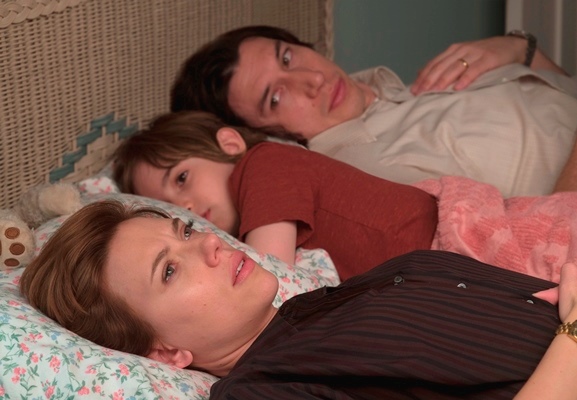

Can this marriage be saved?
Charlie (Adam Driver) wants to stay in New York where his avant-garde theater is thriving. Nicole (Scarlett Johansson) wants to move to Los Angeles where her family lives and the acting roles are plentiful. Their 10-year marriage is at a turning point. Despite the needs of their young son, Henry (Azhy Robertson), and loving feelings for each other that have not abated, the couple plunges into a downward spiral toward divorce.
Noah Baumbach digs deep to explore the facets of modern uncoupling, succeeding Woody Allen as the go-to writer/director for intimate, dialogue-fueled films in the milieu of artists and intellectuals, particularly in New York.
Driver and Johansson are in peak form in gutsy performances that delineate the push and pull of modern career-oriented couples. Nicole finds herself subsumed by Charlie’s ambition and tastes, but she resists the status quo by landing a TV pilot that takes her to LA, along with eight-year-old Henry. “I want a different life,” is her rallying cry. This, as Charlie’s production of Electra is about to open on Broadway.
A heartbreaking tale ensues, including the minutiae that come with navigating a bicoastal divorce, such as transcontinental flights and residency requirements.
The battle escalates when Nicole hires a lawyer (Laura Dern, never better) who raises the stakes—becoming more aggressive than the couple expected—to the point where Charlie feels compelled to go head-to-head with her. “I need my own asshole,” he says, after his first attorney (Alan Alda) turns out to be too civil. An amicable divorce is no longer possible, one where Charlie could share his very recent MacArthur “Genius” Grant with his soon-to-be-ex-wife.
An inscrutable social worker evaluates the parents, at each’s home with Henry, and reaches the heart of the issues for the family in flux, exposing her drinking and his ignorance of his son’s world, such as a new found interest in vegetarianism. The fix is in: there is so much more space for a child in LA, and Henry loves the pool and tree house. The mutual hostility of the couple boils over into a scalding fight of insults and accusations, and the drawn-out scene is as realistic as it is excruciating.
Pain is leavened with Baumbach’s subtle wit, such as Charlie and Nicole each singing a tune from Stephen Sondheim’s 1970 musical, Company in social gatherings. “Someone to hold me too close. Someone to hurt me too deep,” he croons. “You could drive a person crazy. You could drive a person mad,” sings Nicole with her mother (Julie Hagerty) and sister (Merritt Weaver).
Cinematographer Robbie Ryan (American Honey, The Favourite) shot in 35mm, with an emphasis on close-ups to capture the inner turmoil of the couple, alternating their points of view. Grim at the custody hearing and crushed in the face of a breakup, Johansson is especially expressive as a damaged soul who blossoms with strength and yet is forlorn with her new reality.
Other notable technical credits include editor Jennifer Lame (Manchester by the Sea), who creates a montage of moments illustrating Charlie and Nicole’s favorite qualities in the other, an assignment by their marriage mediator, as the film opens. She’s an infectious dancer. He’s a great dresser. All three family members are competitive in Monopoly.
As a filmmaker known to mine his own life for film inspiration, Baumbach undoubtedly drew from the split with his ex-wife, Jennifer Jason Leigh. Leigh starred in and co-wrote his 2010 film, Greenberg, and gave birth to their son Rohmer—named for French film director Eric Rohmer—at the time of that film’s release. She filed for divorce a few months later, citing irreconcilable differences. (Greenberg also starred Greta Gerwig, Baumbach’s current partner and the mother of his second child.)
Previously, Baumbach had recounted his parents’ divorce from his perspective as a child, in The Squid and the Whale (2005), for which he won an Oscar for best original screenplay. In his more recent films, While We’re Young (2015) and The Meyerowitz Stories (New and Selected) (2017), he has moved beyond episodic stories to accomplished narrative trajectories.
With Oscar worthy performances by Driver, Johansson, and Dern, as well as Baumbach’s crisp screenwriting filled with crackling dialogue, the Netflix film is being distributed in theaters during the awards season, as well as streaming on its own platform in late November.
Marriage Story is a bittersweet yet compelling journey, an education in the divorce process, and a satisfying love story in all its peaks and valleys.
















Leave A Comment